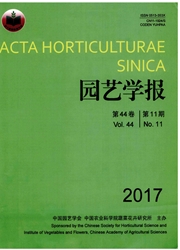

 中文摘要:
中文摘要:
[目的]研究低浓度Mn2+、Cu2+或Zn2+营养液育苗对嫁接黄瓜叶片Mn、Cu和Zn含量,冷胁迫下SOD及其同工酶活性及电解质渗漏率的影响。[方法]用含有低浓度Mn2+、Cu2+或Zn2+营养液培育嫁接黄瓜幼苗,然后进行冷处理。[结果]降低营养液Mn2+、Cu2+或Zn2+浓度,嫁接黄瓜幼苗叶片SOD活性降低,电解质渗漏率增大,其中以Mn2+浓度降低对SOD活性和电解质渗漏率的影响最大,Cu2+次之,Zn2+影响最小。[结论]可以通过改变营养液中Mn2+、Cu2+或Zn2+含量进而改变黄瓜的抗冷性。
 英文摘要:
英文摘要:
[Objective] The research aimed to study the effects of reducing the concentrations of Mn2+, Cu2+ or Zn2+ in nutrient solution on the contents of Mn, Cu and Zn of grafted cucumber leaves as well as on the SOD and isozymes activities and the rate of electrolytic leakage under cold stress. [Method] Nutrient solution containing low concentrations of Mn2+, Cu2+ or Zn2+ were used for cultivating the grafted cucumber seedlings for the cold treatment. [Result] The results indicated that reducing the concentrations of Mn2+, Cu2+ or Zn2+ in nutrient solution had declined the SOD activities in grafted cucumber leaves and increased the rates of electrolytic leakage. Mn2+ had shown the maximum influences, followed by Cu2+, and Zn2+ had shown the minimum influences. [Conclusion] Cold resistance of cucumber can be improved by changing the contents of Mn2+, Cu2+ or Zn2+ in nutrient solution.
 同期刊论文项目
同期刊论文项目
 同项目期刊论文
同项目期刊论文
 期刊信息
期刊信息
